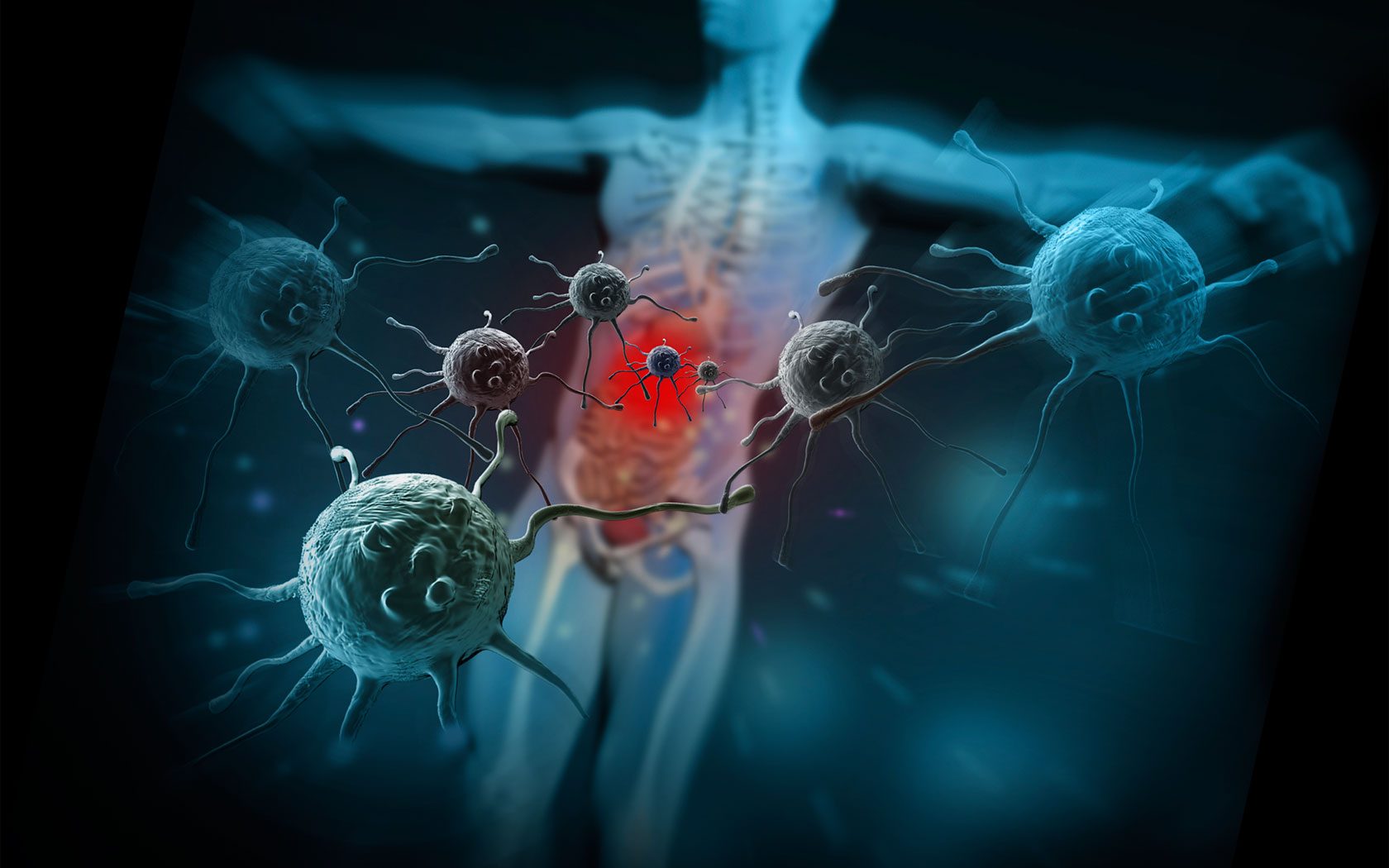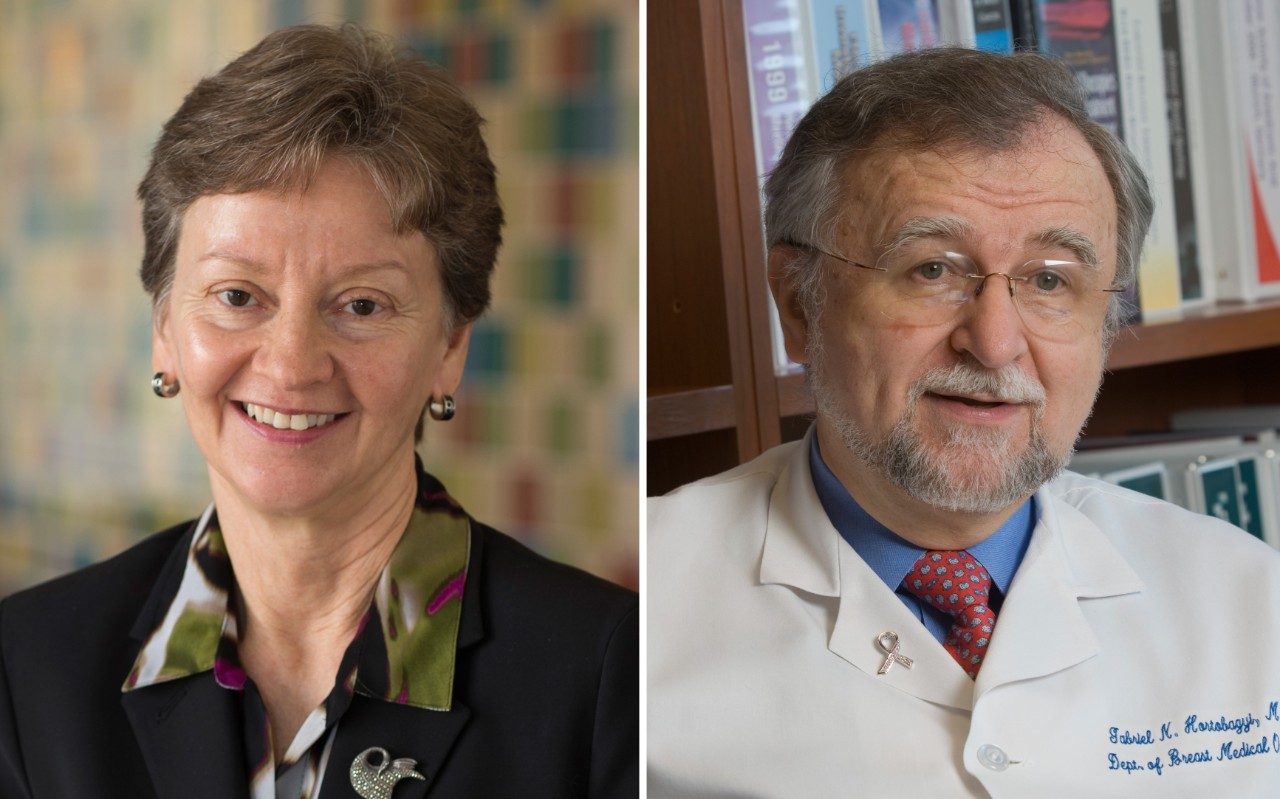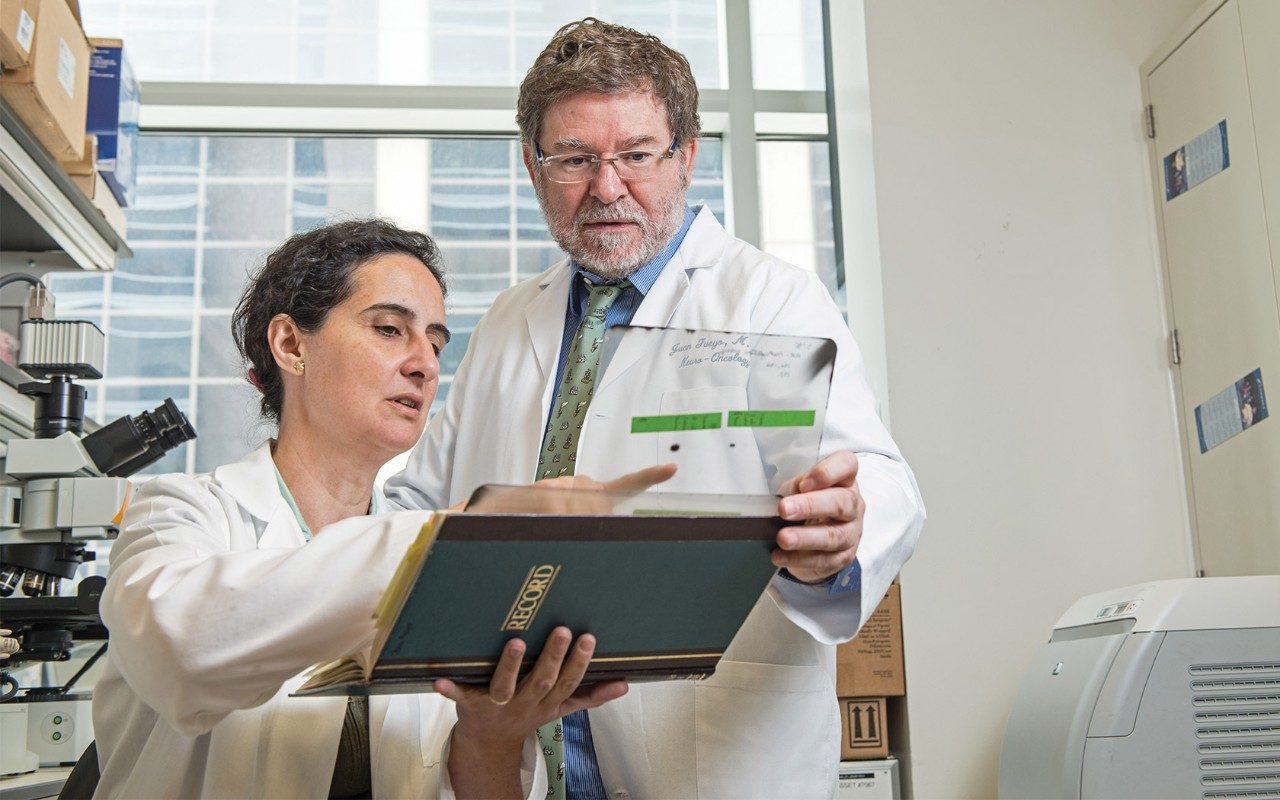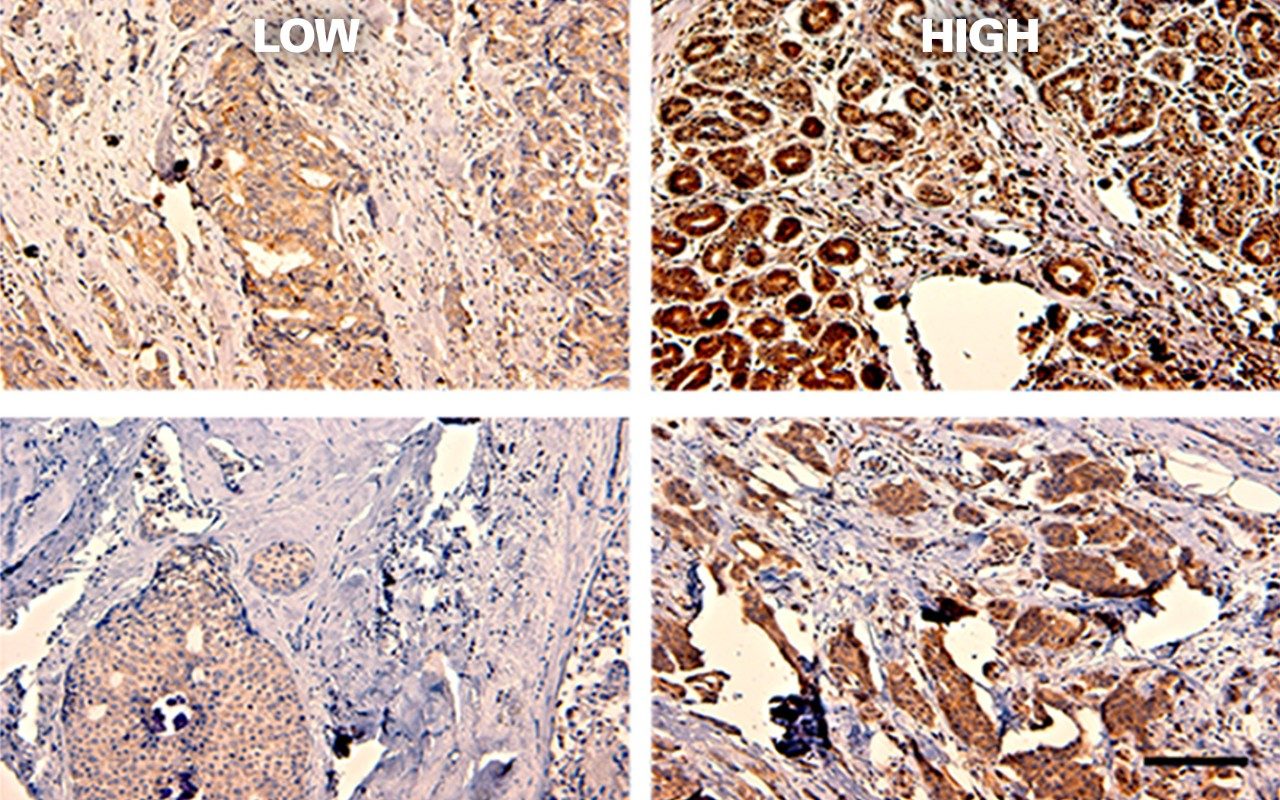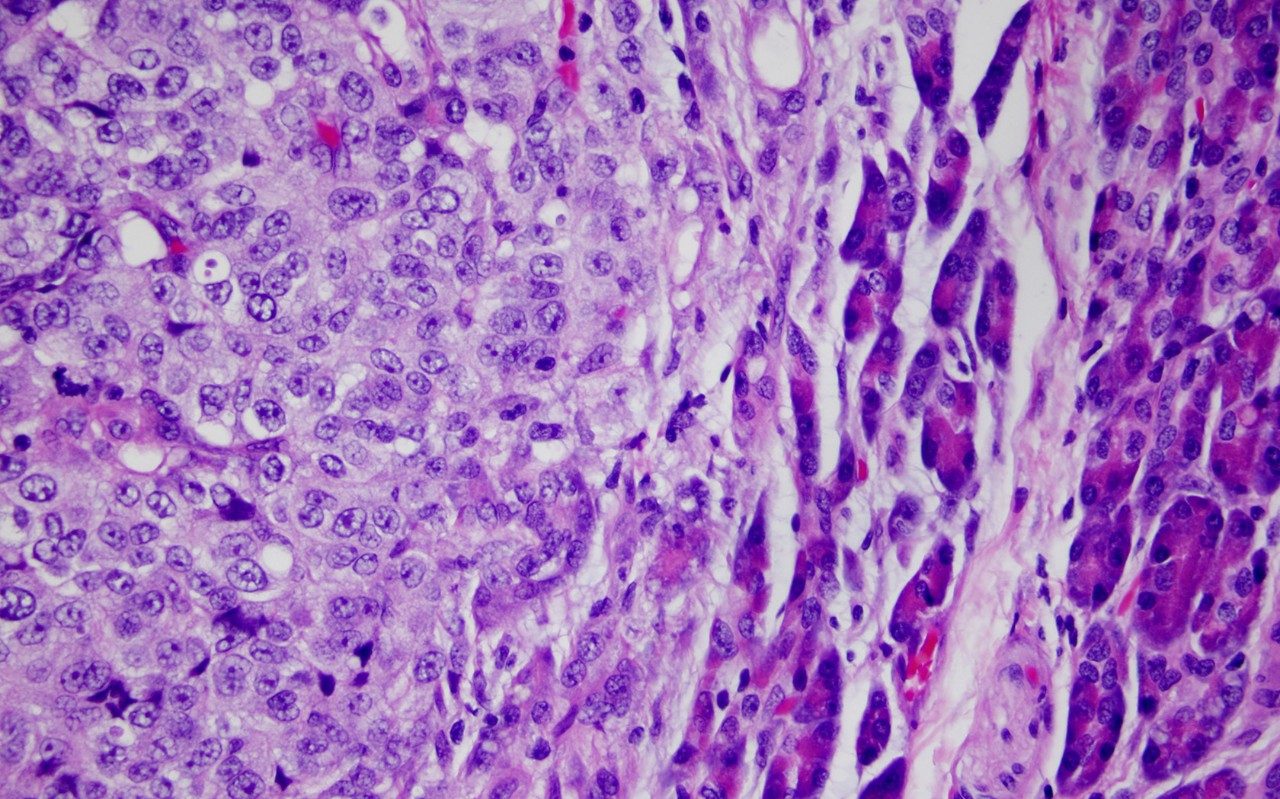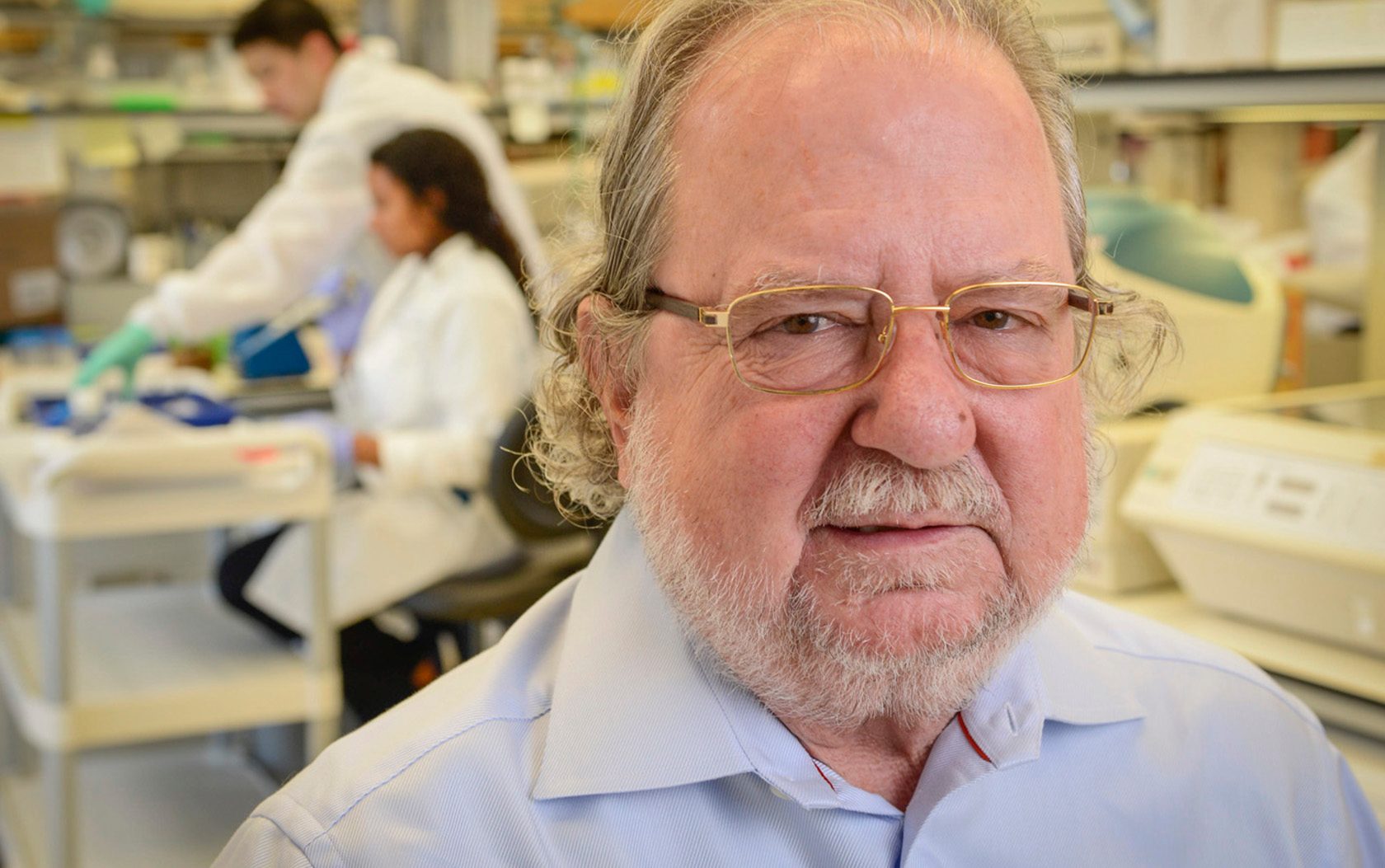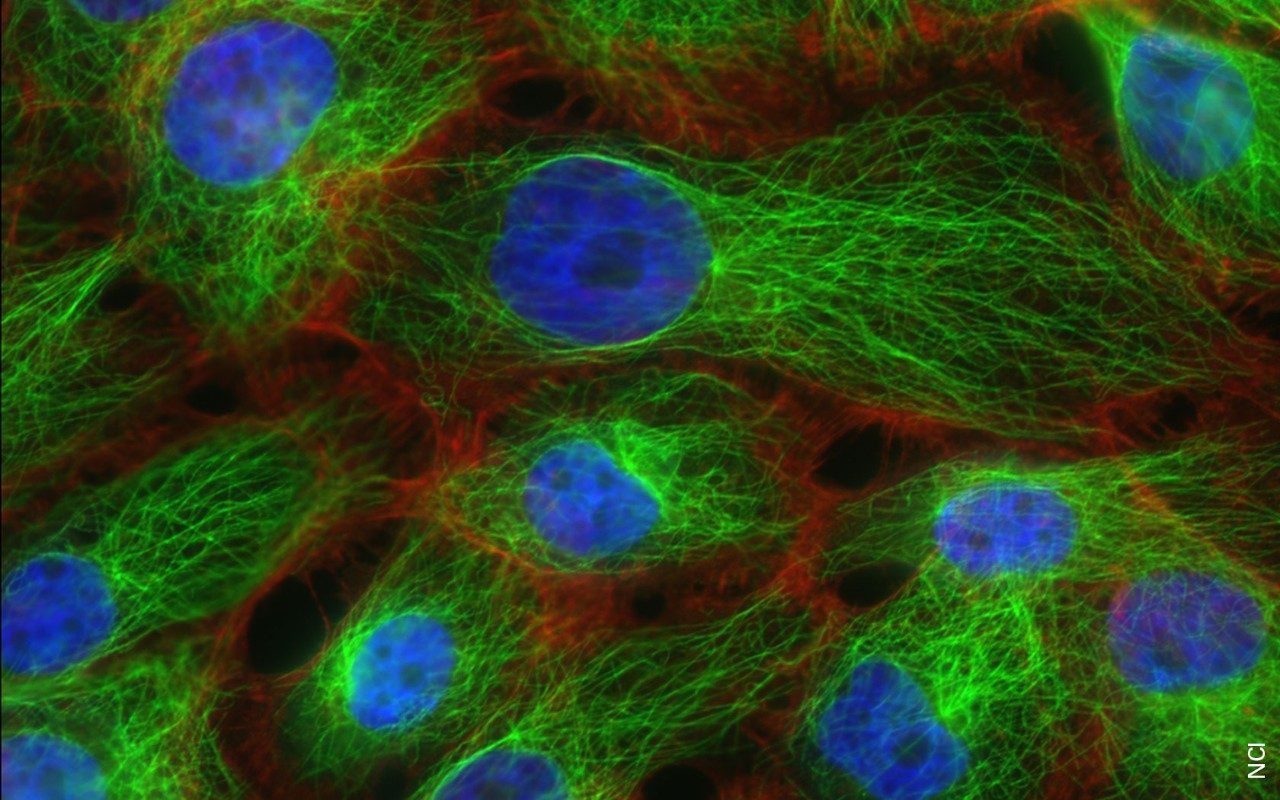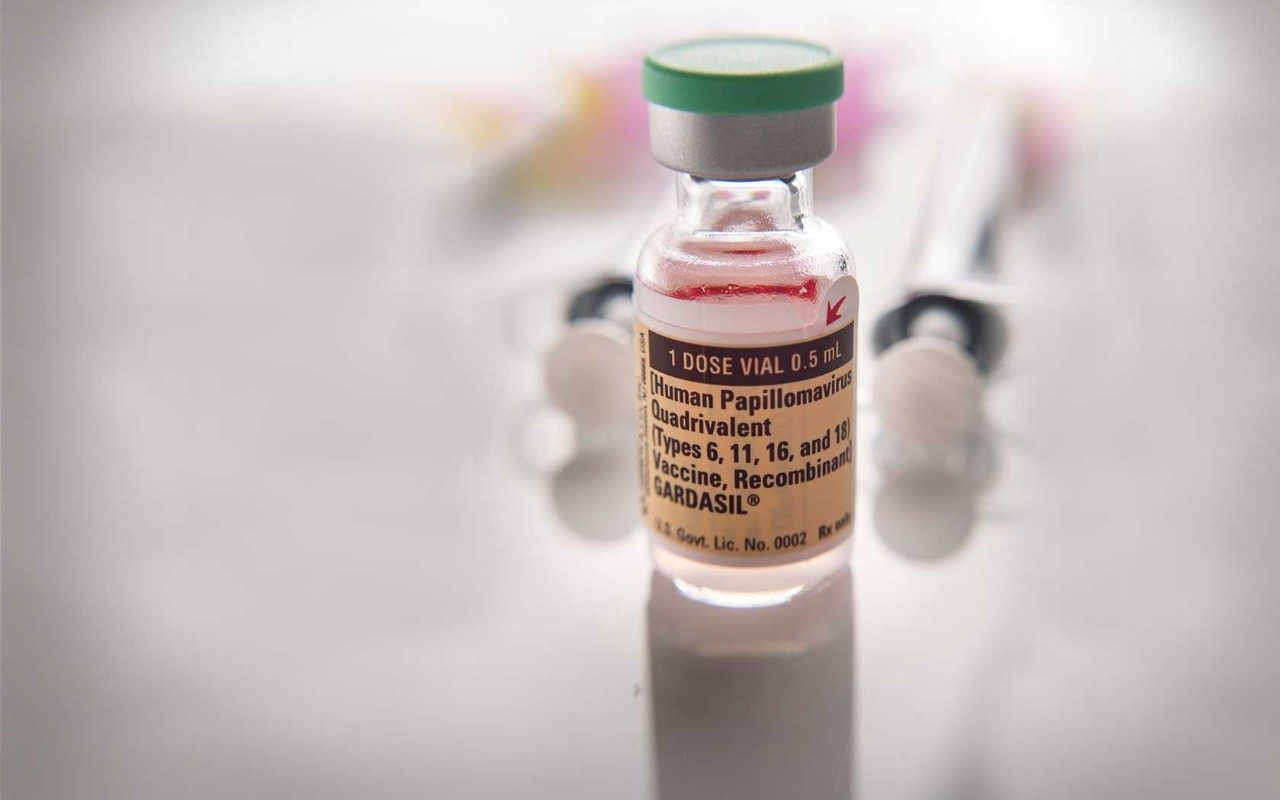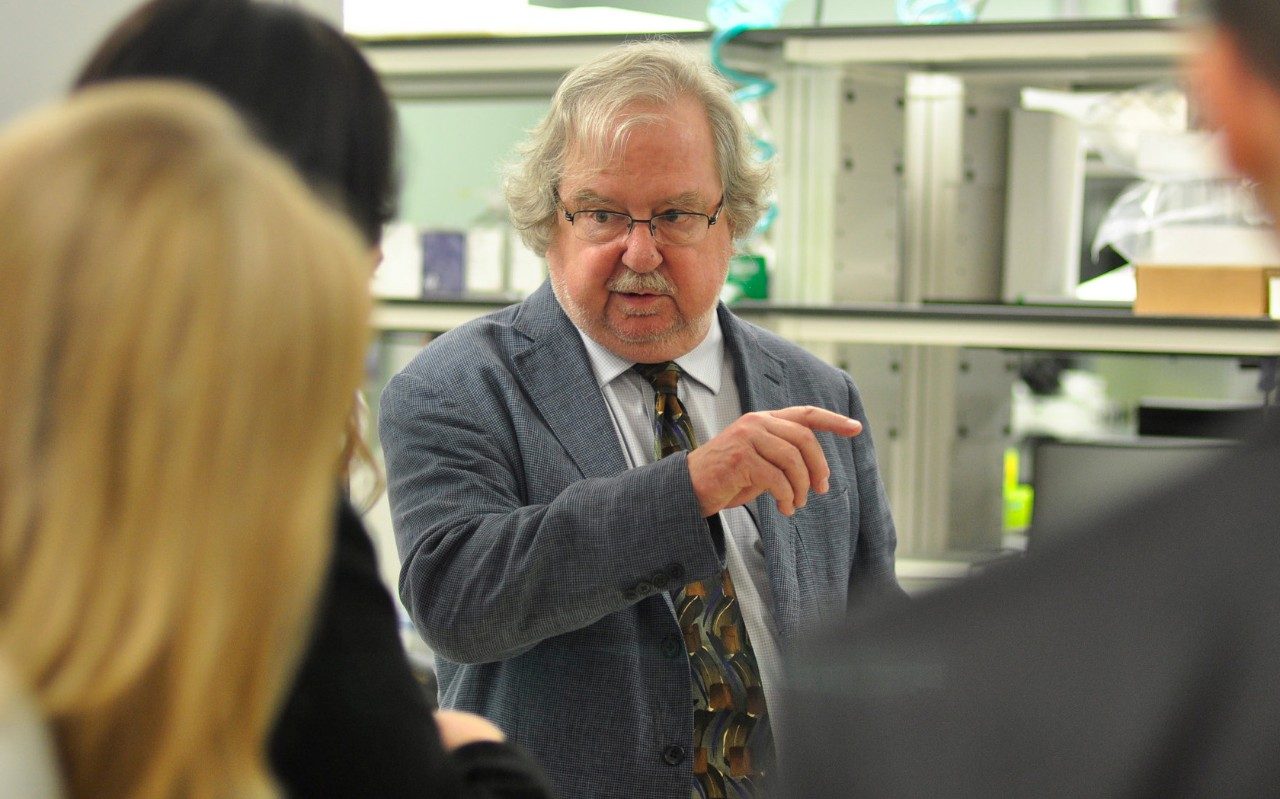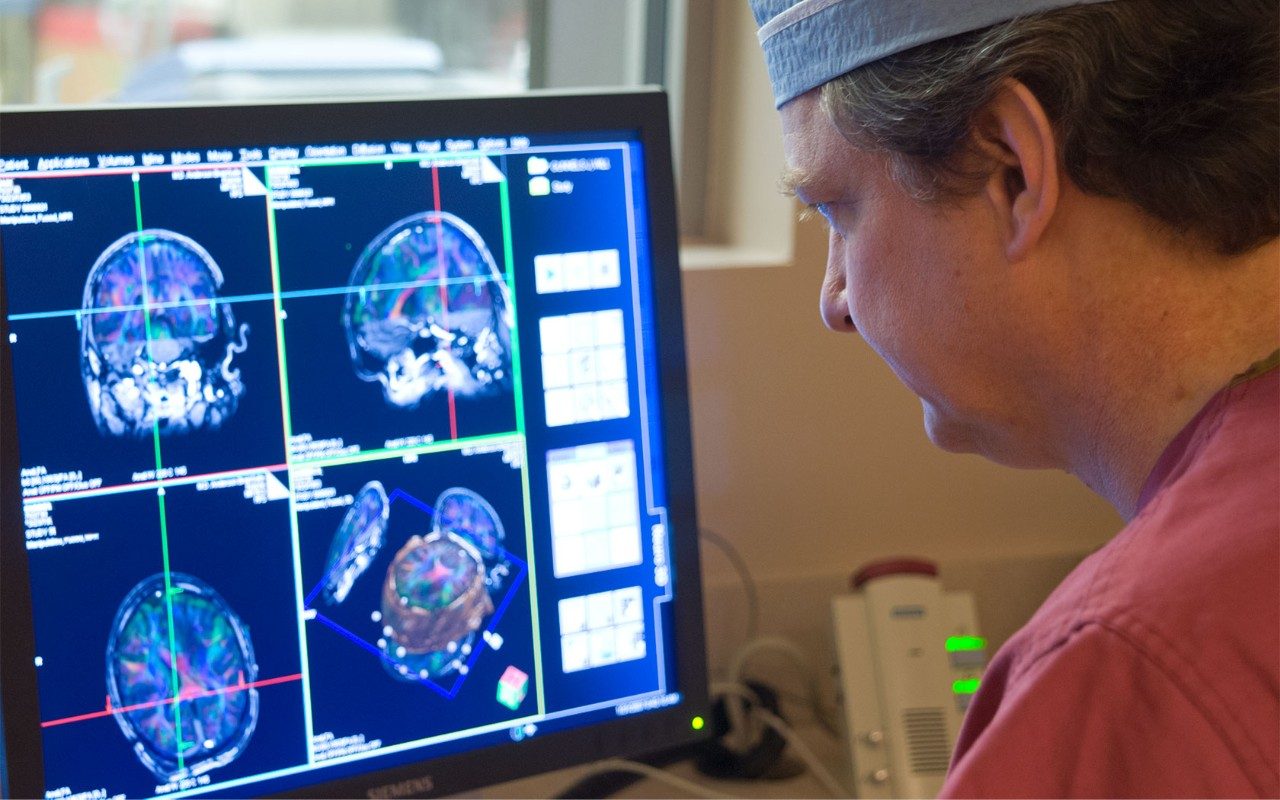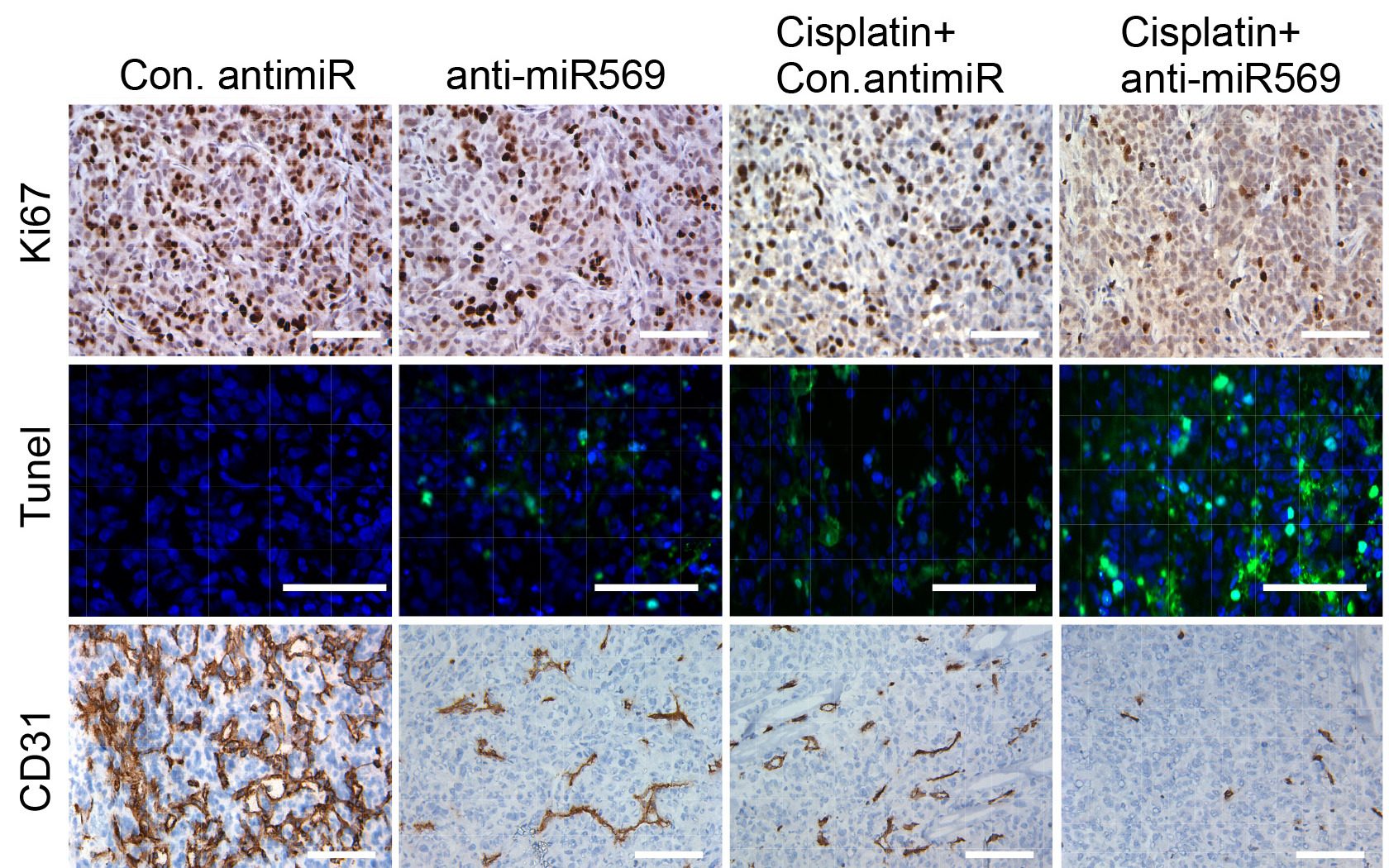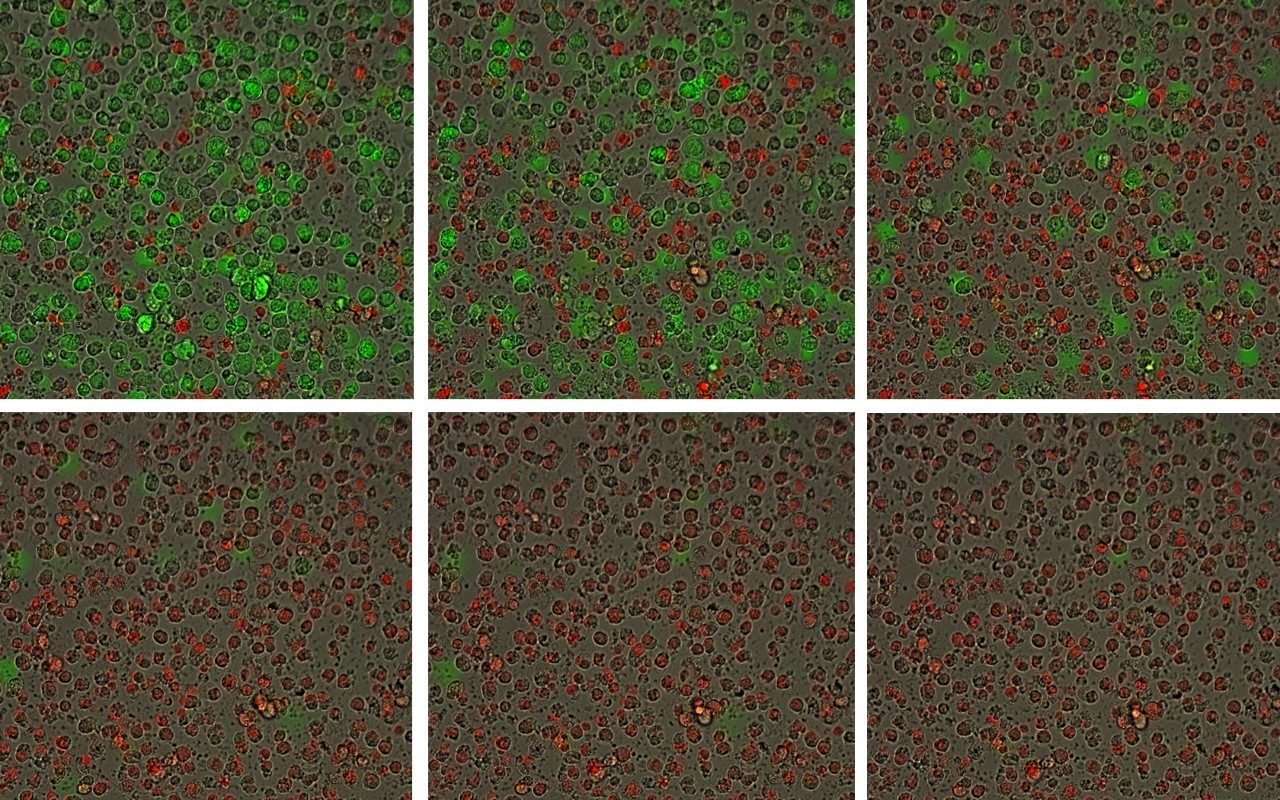Alliance formed to cure glioblastoma with personalized medicine
A new-generation clinical trial for glioblastoma multiforme (GBM) — the deadliest form of brain cancer – will begin enrolling patients by mid-year 2016. The trial is designed to identify effective treatments faster for this aggressive form of brain cancer which kills half of all patients diagnosed within one year. Five years after diagnosis, the survival rate is less than 2 percent.
The international trial is adaptive, meaning...
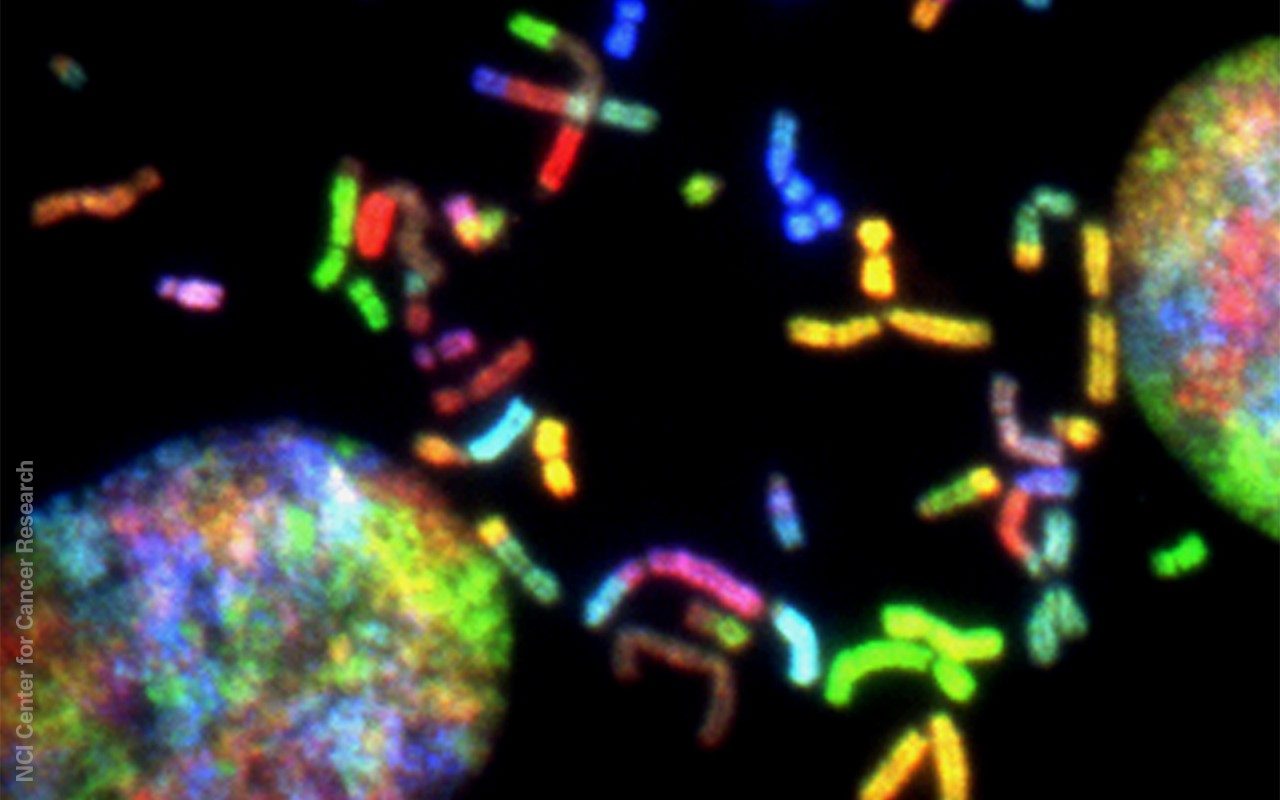
CLL survival greatly improved by ibrutinib
A multi-center, international, randomized, Phase III study of older untreated patients with chronic lymphocytic leukemia (CLL) demonstrated...
Why some drugs don’t work against pancreatic cancer
An MD Anderson study may explain why chemotherapy drugs such as gemcitabine are ineffective against pancreatic cancer in some patients. The...
This gene could unlock an immune attack on cancer
A team led by researchers at MD Anderson Cancer Center reports a crucial tumor-thwarting gene protects an immune attack against lung cancer by blocking the key to an off switch on T cells, the customized warriors of the immune system. The study was published in the Journal of the National Cancer Institute.
“Identifying this role for tumor-suppressing p53 provides both a potential biomarker for response to important new cancer immunotherapy...

Innovations in the OR
A cadre of elite surgeons is making a mark as pioneering researchers at MD Anderson. In the operating room, they’re not just excising tumors...
Some colorectal cancers recur after treatment. But why?
Cetuximab, marketed as Erbitux®å, is one of the key therapies for metastatic colorectal cancer. Yet the cancer still returns in some patients...
How you cook meat could cause cancer
Diets high in meats cooked by high-temperature techniques such as barbecuing and pan-frying, which produce carcinogenic compounds, may lead...
Big collaboration based on nano-sized particles
Leveraging recent advances in the biology of extracellular vesicles and their role in intercellular communication, Codiak BioSciences, Inc...
CPRIT grants continue to fuel the cancer fight
MD Anderson Cancer Center was awarded more than $22 million in research grants in November from the Cancer Prevention and Research Institute...
Two faculty members named AAAS Fellows
Distinguished contributions to understanding p53 tumor suppression in stem cells and breakthrough advances in treating breast cancer have...
Why are HPV vaccination rates so low?
National leaders and cancer center representatives recently met in Houston to review strategies for improving human papillomavirus (HPV) vaccination...
A simple answer for patients with Lynch syndrome
People with Lynch syndrome face a high risk of colorectal cancer. But researchers think that reducing this risk may be as easy as taking a...
Is the common cold the cure for cancer?
Glioblastomas, or malignant gliomas, are sometimes called “grow-and-go” tumors. They make their own blood supply, which fuels the tumors’...
Why a protein causes tumor growth in brain, but not other organs
It’s no surprise that people enjoy warm places like Hawaii, but may suffer in hostile locales such as Antarctica. A tumor suppressor gene...
Experts' goal? Tweak skin cancer prevention game plan
Cancer prevention experts throughout the nation discussed new strategies for preventing skin cancer at the Texas Skin Cancer/Melanoma Screening...
A better therapy for lung cancer
An analysis of an international, cooperative-led trial of patients with locally advanced non-small cell lung cancer (NSCLC) has shown that...
The reasons why an anemia drug is hurting some patients
Scientists have shown why a drug widely used to treat chemotherapy-induced anemia in ovarian and breast cancer patients also may shorten survival...
Partnership yields new immunotherapy drug and a clinical trial
A new drug that’s based on MD Anderson research and designed to rev up an immune system assault on cancer has advanced to clinical trial both...
Expanding the moon shots mission
MD Anderson’s Moon Shots Program has expanded its targets, adding some of the most intractable cancers to its campaign to more rapidly convert...
CVS's tobacco sales removal is proving effective
It’s been a year since CVS Pharmacy, the nation’s second largest chain of drugstores, stopped selling tobacco, and the company claims the...
Immunotherapy drug extends survival for kidney cancer patients
For the first time, a new drug from the field of immuno-oncology has proven to extend survival for patients with advanced kidney cancer, a...
Vaccine helps T cells target tumors
A vaccine that delivers an antigen to dendritic cells, in turn activating killer T cells that can target specific cancers, is being investigated...
Old surgical guidelines getting a fresh look
Patients who undergo surgery are recovering faster and getting discharged sooner thanks to MD Anderson’s enhanced surgical recovery programs...
A prescription for hope
Rafael Pantoja had all but lost hope.
The thyroid cancer he had battled for 14 years was back and spreading.
Then, earlier this...
Drug may become new standard of care for lung, GI NETs
A drug for pancreatic cancer that is also used to prevent rejection of organ transplants has been shown to delay progression of another form...
MD Anderson’s Allison wins American Cancer Society medal of honor
A career-long fascination with discovering the ins and outs of T cells, our immune system’s tailor-made destroyers of infections and dysfunctional...
MD Anderson, Immatics partner to develop adoptive cellular therapies
Immatics Biotechnologies GmbH (Immatics) and MD Anderson have announced the launch of Immatics US, Inc., a new company aiming at becoming...
Study reveals insight into DNA repair
DNA double-strand breaks (DSBs) are the worst possible form of genetic malfunction that can cause cancer and resistance to therapy. New information...
New partnership to test immuno-oncology on solid tumors
Merck and MD Anderson have announced a strategic clinical research collaboration to evaluate Merck’s anti-PD-1 therapy, KEYTRUDA®å (pembrolizumab...
This generic heart medication may improve survival
In a first-of-its-kind study, researchers at MD Anderson Cancer Center have demonstrated a benefit in overall survival among epithelial ovarian...
Biomarker signals poor survival for colorectal cancer patients
An MD Anderson study has found that a protein called CSN6 is linked to poor survival among patients with colorectal cancer.
The study...
Former four-star admiral tapped as moon shots leader
MD Anderson has appointed former U.S. Public Health Service four-star Admiral Joxel Garcia, M.D. as the inaugural executive director of the...
Exploring tumor ‘microenvironment’ for alternate treatment approach
Scientists know that activation of growth factor receptors such as epidermal growth factor receptors (EGFR) promote tumor progression in many...
Immunotherapy trailblazer Jim Allison wins Lasker Award
For his groundbreaking work in immunotherapy, Jim Allison, Ph.D., chair of Immunology at MD Anderson Cancer Center, will receive the nation...
A quest to detect lung cancer — before it’s too late
Early in his career, Sam Hanash, M.D., Ph.D., faced the difficult task of telling the families and loved ones of late-stage cancer patients...
MD Anderson named the top cancer hospital
MD Anderson has been ranked the No. 1 hospital for cancer care in the nation by U.S. News & World Report’s “Best Hospitals” survey.
Can this protein prevent or kill breast cancer tumors?
Every parent knows the maxim “feed a cold, starve a fever.” In cancer, however, exactly how to feed or starve a tumor has not been easy to...
Similarities between embryos and breast tumors identified
Breast tumors may have something in common with embryos … at least in mice, say researchers at MD Anderson Cancer Center.
A study led...
MD Anderson will be site of Genome Characterization Center
MD Anderson Cancer Center has been named a site for one of two new Genome Characterization Centers (GCC) funded through the National Cancer...
Turning the immune system against metastatic breast cancer
Although the cure rate for breast cancer has risen steadily in recent decades, recurrent or metastatic disease remains difficult to control...
Many colorectal cancer cases among certain group are hereditary
Hereditary colorectal cancers, caused by inherited gene mutations, are relatively rare for most patients. However, researchers at MD Anderson...
Reducing risk while leaving menopause for later
Women with BRCA1 mutations have a 39% risk of ovarian cancer compared to the general population’s risk of 1.3%, while women with BRCA2 mutations...
Mutated gene may boost cancer drugs’ effectiveness
Mutations in the ARID1a gene, which are common in many cancer types, disrupt DNA damage repair in cancer cells, allowing the cancer to progress...
Assembling his 'Tamoxifen Team'
It’s the Friday before Father’s Day, and V. Craig Jordan, Ph.D., who’s considered the “Father of Tamoxifen,” is sitting down to talk about...
Analysis indicates blood cancer drugs are overpriced
The costs associated with cancer drug prices have risen dramatically over the past fifteen years, which concerns many top oncologists. In...
Breast-conserving therapy on the rise, but off-limits to some
The first national review of breast-conserving therapy (BCT) shows that over the last 13 years, rates of this treatment for early-stage breast...
Searching for an alternative to surgery for early lung cancer
Patients with operable stage I non-small cell lung cancer (NSCLC) could achieve better overall survival rates if treated with Stereotactic...
Benefits extended to same-sex married couples
The Supreme Court’s recent ruling on same-sex marriage has cleared the way for MD Anderson Cancer Center to offer some long-awaited benefits...
Blood test could reveal pancreatic cancer earlier
MD Anderson researchers believe they may have found a way to detect pancreatic cancer at an early stage, before it has spread to other organs...
Sign of Epstein-Barr Virus found in chronic lymphocytic leukemia
A molecule expressed by the Epstein-Barr virus is found in the B cells, bone marrow and plasma of patients with chronic lymphocytic leukemia...
MD Anderson collaborates on world’s first skull-scalp transplant
Doctors from MD Anderson and Houston Methodist Hospital have performed what is believed to be the world’s first partial skull and scalp transplant...
New chemo combo for advanced prostate cancer studied
Results of an MD Anderson clinical trial may change the perspective on a role for combination chemotherapy in advanced prostate cancer.
MD Anderson faculty members honored at ASCO's annual meeting
Two MD Anderson faculty members were awarded by the American Society for Clinical Oncology (ASCO) at the society’s annual meeting earlier...
Risks seem to outweigh whole-brain radiation's rewards
Whole brain radiation to treat cancer that has spread to the brain is associated with significantly worse cognitive function than radiosurgery...
MD Anderson, Exact Sciences developing blood tests for lung cancer
MD Anderson and Madison, Wis.-based Exact Sciences Corp. have announced a partnership to co-develop and commercialize several blood-based...
MD Anderson receives $9 million in CPRIT funding
MD Anderson Cancer Center has received more than $9 million in research grants in the latest round of funding from the Cancer Prevention and...
Fighting HPV by learning to talk about the disease
When asked why she’s so passionate about preventing the spread of HPV, Lois Ramondetta, M.D., is quick to answer.
“Cancers are horrible...
A call to action in South Texas
Since its introduction in the 1940s, the Pap test has been successfully detecting abnormal cells in the cervix that, if left untreated, could...
E-cigarettes' growing popularity underscores the need for regulation
In April, new federal data was released showing e-cigarette use has tripled among students in middle and high school. We asked MD Anderson...
Researchers work to control cancer’s evasive actions
New findings about regulation of PD-L1, a protein that allows cancer to evade the immune system, have shown therapeutic promise for several...
A better understanding of a mutation's link to lung cancer
Mutations of the KRAS gene are commonly known to lead to cancer. But deeper understanding of exactly how they do this continues to be explored...
Beyond C-125: Detecting ovarian cancer earlier
Successful ovarian cancer treatment often relies on catching it early. A study at MD Anderson may help point to a new method of detecting...
Harnessing a mushroom’s toxin to kill cancer
For some time, cancer scientists have considered alpha-amanitin, the toxin derived from “death cap” mushrooms, as a possible cancer treatment...
Immunotherapy leader receives Pezcoller Foundation award
Cancer scientist James Allison, Ph.D., internationally known for his role in developing a new class of cancer immunotherapies, has been named...
MD Anderson researchers named to lung and ovarian cancer Dream Teams
Approaches to cancer treatment developed by MD Anderson researchers as part of the institution’s Moon Shots Program will be, in part, the...
Upon further review: Immunotherapy’s curative potential
Immunotherapy is complex, has curative potential for some patients when given alone or combined with other drugs, and needs further support...
A chance to cut off cancer's fuel supply
Think of a waterfall, and you might see why cell-signaling pathways are important to cancer research. As water cascades, it impacts everything...
New hepatitis C drugs may strain the system
The cost of treating people infected with the hepatitis C virus (HCV) with newly approved therapies will likely place a tremendous economic...
Proton therapy offers more precision, fewer side effects for head and neck cancer patients
The good news is death rates continue to decline for the most common types of cancer, including lung, colon, breast and prostate.
The...
A less-invasive route to uterine cancer diagnosis
In a study of women with high-grade uterine cancer, researchers at MD Anderson Cancer Center found sentinel lymph node (SLN) mapping accurately...
Moon Shots Program puts antibody therapies in ORBIT
A new research platform of MD Anderson’s Moon Shots Program will lead a collaboration with an international pharmaceutical company to develop...
MD Anderson immunotherapy innovator wins Paul Ehrlich and Ludwig Darmstaedter Prize
James Allison, Ph.D., chair of Immunology at MD Anderson Cancer Center, was awarded the 2015 Paul Ehrlich and Ludwig Darmstaedter Prize Saturday...
Inaugural awards benefit research, patient care in prostate cancer, cancer genomics and breast cancer
Christopher Logothetis, M.D., chair and professor of Genitourinary Medical Oncology, is the recipient of the inaugural Finneran Family Prize...
Research may show why some brain tumors resist treatment
Scientists at MD Anderson Cancer Center may have discovered why some brain cancer patients develop resistance to standard treatments including...
Patrick Hwu is named head of Cancer Medicine
Patrick Hwu, M.D., chair of Melanoma Medical Oncology and Sarcoma Medical Oncology at MD Anderson Cancer Center, has been named division head...
New surgical protocol for ovarian cancer is showing improved survival rates
Triathlete and marathoner Leslie Russell teaches reading to children with dyslexia in the Spring Branch Independent School District. It’s...
Developing a drug to starve cancer cells
The first experimental drug to be produced by MD Anderson’s drug discovery and development institute will kill cancer cells in a new way —...
MD Anderson receives $22.3 million in CPRIT research funding
It was announced last month that MD Anderson Cancer Center would be awarded more than $22 million in research grants from the Cancer Prevention...
Study: Lenvatinib improves survival for thyroid cancer patients
In a pivotal Phase III study led by researchers at MD Anderson Cancer Center, the oral anti-angiogenic therapy lenvatinib has shown dramatic...
Targeting breast cancer by taking aim at cells that regulate blood flow
Tumors require blood to emerge and spread. That is why MD Anderson Cancer Center scientists believe targeting blood vessel cells known as...
Searching for how melanoma builds resistance to drugs
Powerful drugs known as BRAF-inhibitors have been crucial for melanoma patients, saving lives through their ability to turn off the BRAF protein...
MD Anderson researchers among Journal of Clinical Oncology’s most-cited researchers
Fourteen current and former MD Anderson researchers were represented in 11 of the 50 most-cited Journal of Clinical Oncology (JCO) articles...
Concurrent treatment of HIV and cancer improves survival outcomes
Concurrent HIV and cancer present special challenges in the clinic, regardless of which disease is diagnosed first. The simultaneous treatment...
Former MD Anderson president Mendelsohn ‘Makes History’
John Mendelsohn, M.D., president of MD Anderson from 1996-2011, recently received the Texas State History Museum Foundation’s "History-Making...
MD Anderson president elected to top cancer research academy
Ron DePinho, M.D., president of MD Anderson Cancer Center, will be inducted as a new fellow of the American Association for Cancer Research...
The mystery of what turns a protein to the dark side
Scottish author Robert Louis Stevenson tapped into primal fears when he penned “Dr. Jekyll and Mr. Hyde,” a 19th-century novel about a sinister...
In the press, among peers, Melanoma Moon Shot communicates tanning risk
MD Anderson’s Moon Shots Program continues to keep the issue of indoor tanning — and its impact on teenagers — in the public eye.
The...
Eight signs associated with impending cancer death are identified
Researchers at MD Anderson have identified eight highly specific physical and cognitive signs associated with imminent death in cancer patients...
Understanding the architecture of disease
When skyscrapers go up, contractors rely on an infrastructure of steel beams and braces. Some cancers grow the same way, using a biological...
Collaboration should lead to better mining of clinical trial data
When cancer patients take part in a clinical trial to develop new therapies, they and their physicians want to know how they will feel and...
Less surgery and better survival rates for patients with metastatic colorectal cancer
Thanks to the modern era of new chemotherapeutic and biologic agents available for managing their disease, patients with metastatic colorectal...
Working together to 'move the needle'
MD Anderson continues to rethink how industry and academia can collaborate in deeper and broader ways to develop new drugs and bring improved...
Joining with AstraZeneca to take on ovarian and gynecologic cancers
MD Anderson and AstraZeneca recently announced a multi-year strategic research collaboration to conduct multiple, parallel clinical and clinically...
MD Anderson receives top Chinese science and technology award
MD Anderson was presented the People’s Republic of China International Science and Technology Cooperation Award last month at a ceremony at...
Shorter radiation course at higher doses may be beneficial
A shorter course of radiation therapy at higher doses per fraction than the standard regimen could reduce side effects and improve quality...
World Cancer Day and MD Anderson's daily mission
Feb. 4 is World Cancer Day, which was organized by the Union for International Cancer Control to raise awareness of the actions needed to...
Combination therapy effective for higher-risk MDS/AML patients
A phase two study investigating the potential of the drugs azacitidine (AZA) and lenalidomide (LEN), demonstrated that the two therapies in...
Antifibrotic agent showing benefits for advanced myelofibrosis
A study investigating the potential of the antifibrotic compound PRM-151 (PRM) for reducing progressive bone marrow fibrosis (scarring) in...
Efforts to improve treatments for melanoma of the eye
Although primary uveal melanoma can be effectively treated with radiation or surgery, patients with metastatic disease — or those at high...
Health research: Pay now or pay later
By reducing investments in medical research, any short-term savings will prove to be very costly in the long run — and not just financially...
Targeting microRNA may benefit some ovarian and breast cancer patients
A genetic misfire called the 3q26.2 amplicon can cause real havoc. In fact, it’s among the most frequent chromosomal aberrations seen in many...
MD Anderson, Intrexon and ZIOPHARM connect on immunotherapy
Biotech companies Intrexon and ZIOPHARM Oncology have licensed unique MD Anderson immunotherapy technology, creating an...






